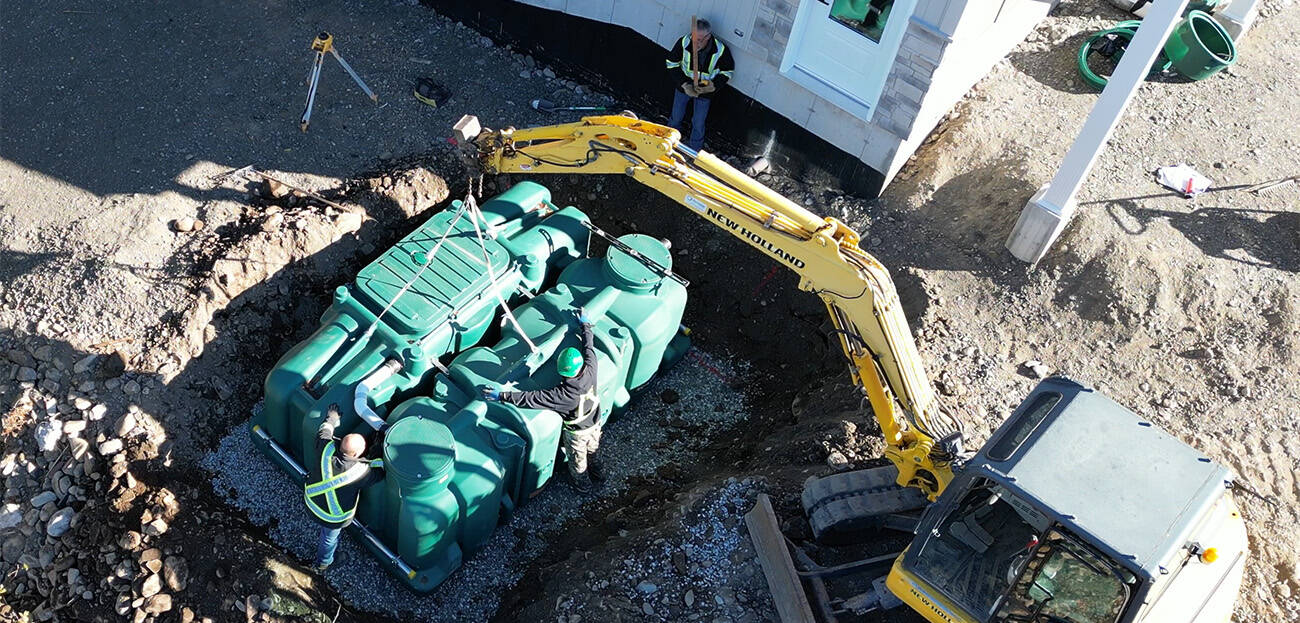Ecological alternatives to sand mound and sand filter septic systems

Sand has long been a staple in the on-site wastewater treatment industry. Whether for sand mounds or sand filters, it is an integral part of many conventional septic tank systems.
In Ontario alone, approximately 3.5 million tonnes of sand are extracted and used for on-site wastewater treatment each year.
That demand is mirrored across countless industries. We use sand to make concrete and glass. It is a key part of the chips in our mobile phones and computers. It is even in the toothpaste we use morning and night.
In fact, sand is such an indelible part of our lives that it is second only to water as the most consumed natural resource on the planet.
But there is a big problem with sand. It is no longer sustainable.
The environmental cost of sand
More than a third of the Earth’s land surface is covered in desert, so it seems crazy that sand could be an unsustainable resource. But a closer look tells a different story.
Desert sand is too fine and smooth for most industrial and construction purposes. Instead, the best sand for our needs comes from lakes, seashores, riverbeds, riverbanks, and floodplains. The number of these deposits is limited, and our reserves are shrinking fast.
Extraction rates now outpace natural replenishment rates. As high-quality sand becomes increasingly scarce and expensive, the environmental impact of sand mining is clear:
- inland and coastal erosion
- more frequent and intense flooding
- watershed and marine current changes
- lower water tables with greater concentrations of pollutants
- poor air quality and noise pollution near extraction sites

Other problems with sand mound and sand filter systems
While the main downside of sand-based septic systems is their ecological impact, it's not the only concern. Depending on your needs and preferences, consider these additional drawbacks of sand mounds and filters.
Cons of sand mounds
- Aesthetics
A raised mound can be an eyesore on your property and it may not blend well with your landscaping.
- Large area required
Sand mounds require a considerable amount of space, which can be a problem if your property has a small lot.
- Water usage sensitivity
Sand mound systems are sensitive to excessive water use. Significant and prolonged spikes in toilet, shower, washing machine, or dishwasher use could lead to system overload and failure.
- Frost sensitivity
In cold Canadian climates, sand mounds can be subject to frost heaves that disrupt your system’s operation.
- Limited lifespan
The lifespan of a sand mound can be shorter compared to other types of septic systems. They often require excavation and replacement after 20 to 30 years.
Cons of sand filters
- Large area required
Sand filters are not as extensive as sand mound systems, but they still require a significant amount of land. This can be a limitation if you live on a small property.
- Odours
If not properly maintained, sand filter systems can produce unpleasant smells due to the build-up of organic matter.
- Energy consumption
Sand filter systems often require a pump to move effluent through the filter, leading to ongoing energy costs.
- Potential for clogging
Sand filters can become clogged with organic matter, which reduces their effectiveness and can cause system backups.
- Replacement costs
The potential for clogging has a very real impact. If the sand in your filter bed clogs, it will need to be replaced. This process can be costly and labour-intensive.
Sustainable alternatives to sand-based septic systems
The time has come to rethink how and where we use septic sand. For rural homes and cabins, that means choosing an alternative septic system that uses little to no sand for treatment or final dispersal.
Take our Ecoflo compact biofilter, for example. It is an aerobic treatment system that filters wastewater through a 100% natural, compostable, and renewable coco filter. Sand is used only in the final dispersal area, and only when local regulations require it.
The beauty of the Ecoflo compact biofilter is that it is a permanent solution. When its filtering medium no longer treats wastewater effectively, usually after 10 to 15 years of use, we renew it without ever having to relocate the system or damage your landscaping.
Our solution is a stark contrast to conventional systems requiring sand mounds or sand filters. As these traditional systems treat wastewater, they accumulate sludge that leads to progressive system failure. They eventually clog, and when they do, the entire system must be dug up and replaced.

What else makes Ecoflo the greenest alternative?
The Ecoflo compact biofilter is the most sustainable septic system available, and not just because it allows property owners and industry professionals to make intelligent use of our planet’s limited sand resources.
With its all-natural coco filter and energy-free treatment process, our green septic system has the lowest carbon footprint in the industry. From production and shipping to installation, maintenance, and usage, no other product can compare.

Want to know if Ecoflo is right for you?
Our septic system experts are waiting to hear about your project. Share your ideas with us and we’ll recommend the best solution for your home, cabin, or business.






